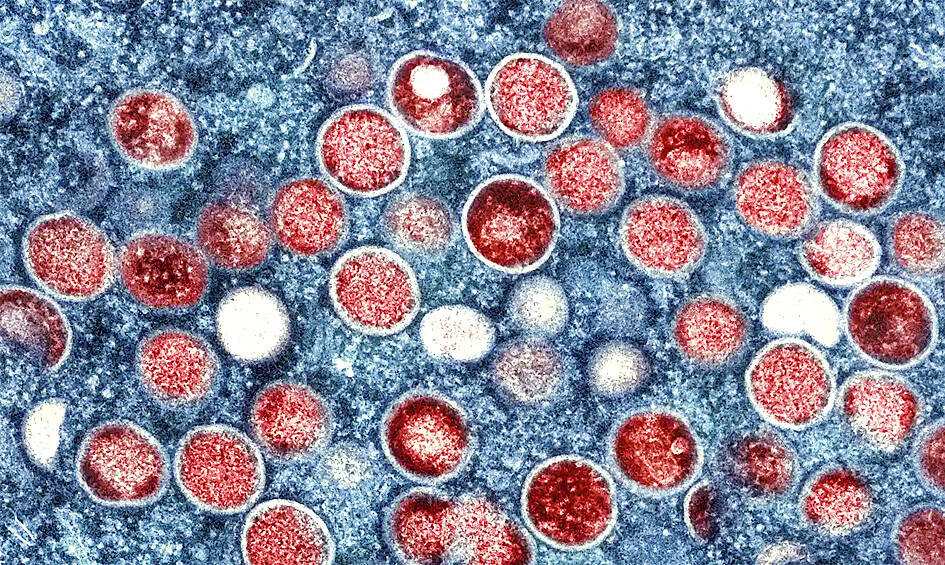A top Chinese health official has warned the public to avoid “skin-to-skin contact with foreigners” to prevent the spread of monkeypox after the nation confirmed its first case.
The person had recently arrived from overseas and is in quarantine, health officials said earlier.
“To prevent possible monkeypox infection and as part of our healthy lifestyle, it is recommended that 1) you do not have direct skin-to-skin contact with foreigners,” Wu Zunyou (吳尊友), chief epidemiologist at the Chinese Center for Disease Control and Prevention (CCDC), wrote in a post on Sina Weibo on Saturday.

Photo: AP
Wu also urged people to avoid skin-to-skin contact with people who had been abroad within the past three weeks, as well as all “strangers.”
He said China’s strict COVID-19 restrictions and tight border controls had so far prevented the spread of monkeypox, and cautioned against allowing cases to “slip through the net.”
His post was widely shared across Chinese social media platforms over the weekend, but the comments section under the initial post was disabled.
Some who commented on forwarded versions or screenshots of his post were concerned Wu’s guidelines could lead to xenophobia, and drew parallels to the violence Asian people overseas faced at the start of the COVID-19 pandemic due to the association of the virus with people of Chinese heritage.
Several wrote that there were foreign workers and long-time residents in China who have not left the country due to COVID-19 restrictions.
“Did someone jump and scream discrimination?” one commentator wrote.
“Does he know that many foreigners have been staying in China for years?” another said.
The patient is a 29-year-old salesman who engaged in male-to-male sex when he visited Berlin this month, the CCDC said in a separate report, adding that he then traveled to Spain before returning to China.
Asked whether the warning is official government policy, Chinese Ministry of Foreign Affairs spokeswoman Mao Ning (毛寧) yesterday said it “is an issue relation to public health” and that it was “not a diplomatic issue.”
Additional reporting by Bloomberg

A Ministry of Foreign Affairs official yesterday said that a delegation that visited China for an APEC meeting did not receive any kind of treatment that downgraded Taiwan’s sovereignty. Department of International Organizations Director-General Jonathan Sun (孫儉元) said that he and a group of ministry officials visited Shenzhen, China, to attend the APEC Informal Senior Officials’ Meeting last month. The trip went “smoothly and safely” for all Taiwanese delegates, as the Chinese side arranged the trip in accordance with long-standing practices, Sun said at the ministry’s weekly briefing. The Taiwanese group did not encounter any political suppression, he said. Sun made the remarks when

The Taiwanese passport ranked 33rd in a global listing of passports by convenience this month, rising three places from last month’s ranking, but matching its position in January last year. The Henley Passport Index, an international ranking of passports by the number of designations its holder can travel to without a visa, showed that the Taiwan passport enables holders to travel to 139 countries and territories without a visa. Singapore’s passport was ranked the most powerful with visa-free access to 192 destinations out of 227, according to the index published on Tuesday by UK-based migration investment consultancy firm Henley and Partners. Japan’s and

BROAD AGREEMENT: The two are nearing a trade deal to reduce Taiwan’s tariff to 15% and a commitment for TSMC to build five more fabs, a ‘New York Times’ report said Taiwan and the US have reached a broad consensus on a trade deal, the Executive Yuan’s Office of Trade Negotiations said yesterday, after a report said that Washington is set to reduce Taiwan’s tariff rate to 15 percent. The New York Times on Monday reported that the two nations are nearing a trade deal to reduce Taiwan’s tariff rate to 15 percent and commit Taiwan Semiconductor Manufacturing Co (TSMC, 台積電) to building at least five more facilities in the US. “The agreement, which has been under negotiation for months, is being legally scrubbed and could be announced this month,” the paper said,

Japan and the Philippines yesterday signed a defense pact that would allow the tax-free provision of ammunition, fuel, food and other necessities when their forces stage joint training to boost deterrence against China’s growing aggression in the region and to bolster their preparation for natural disasters. Japan has faced increasing political, trade and security tensions with China, which was angered by Japanese Prime Minister Sanae Takaichi’s remark that a Chinese attack on Taiwan would be a survival-threatening situation for Japan, triggering a military response. Japan and the Philippines have also had separate territorial conflicts with Beijing in the East and South China